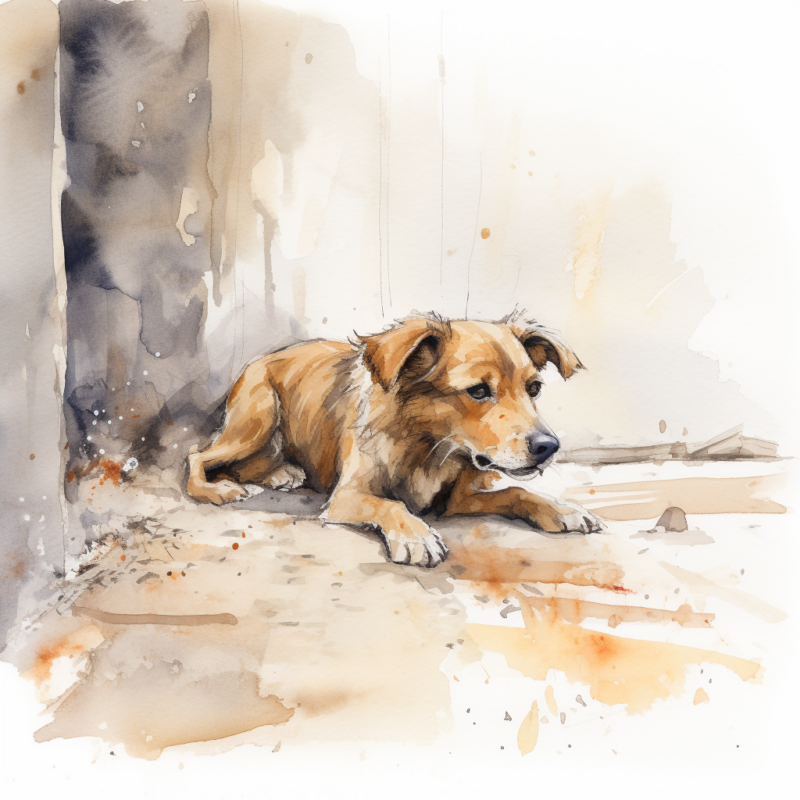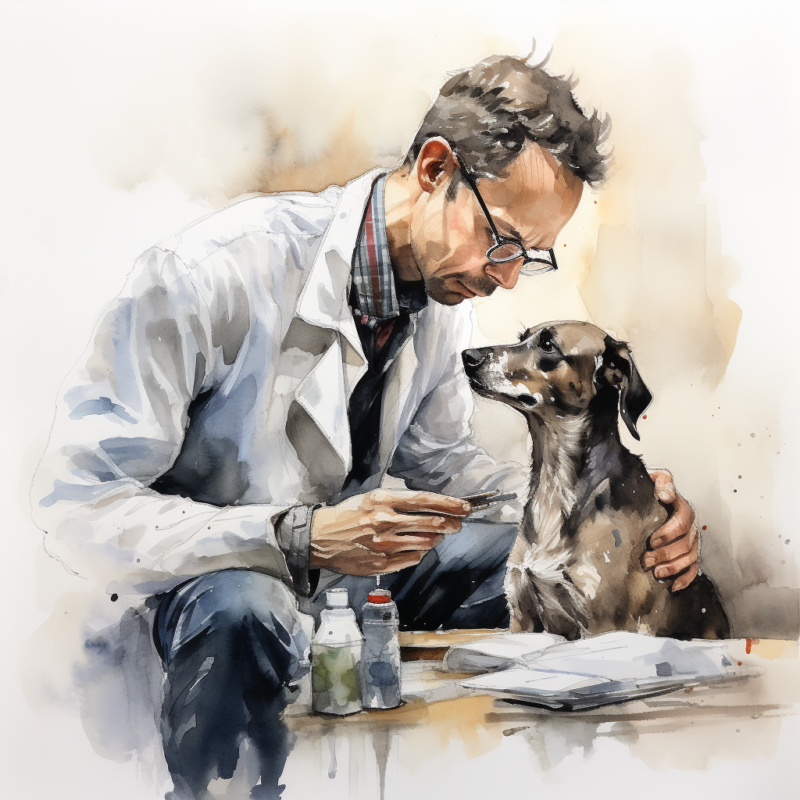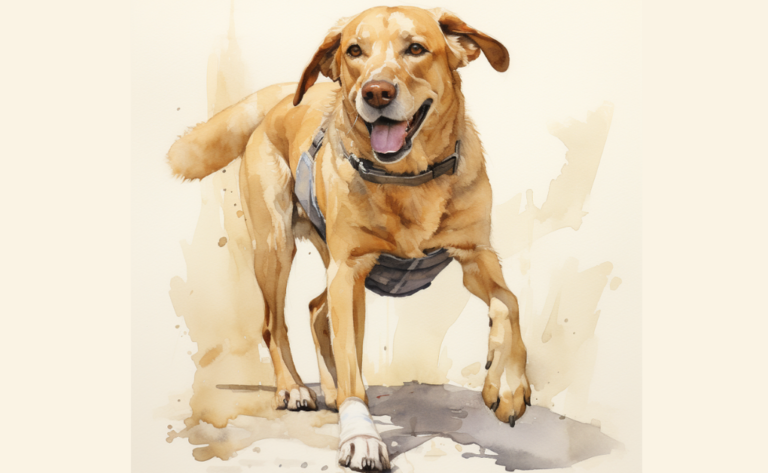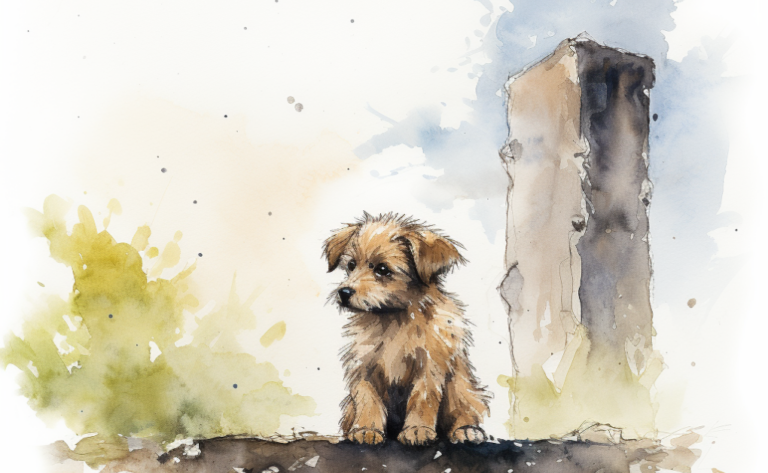What are Nasal Infections in Dogs?
What is it?
How is it Treated?
Breed Predispositions
There is no specific breed predisposition to nasal infections in dogs. However, factors such as underlying health conditions, exposure to environmental hazards, and a compromised immune system may increase the risk of nasal infections in some dogs.
Introduction
During a cozy evening at home, Laura noticed her beloved German Shepherd, Rex, was sneezing more than usual and had a thick discharge coming from his nose. Worried about her loyal companion’s well-being, Laura decided it was time to consult her veterinarian for a thorough check-up. After a detailed examination, the vet diagnosed Rex with a nasal infection, a condition that can affect dogs of all breeds and ages.
The canine nasal passages and sinuses are linked through tiny gateways known as ostia. Rhinitis can lead to inflammation that obstructs these ostia, hindering the standard mucus drainage and initiating sinusitis, often called acute or chronic sinusitis. Similarly, an infection in the sinuses can extend to the nasal passages, resulting in rhinitis. As such, rhinitis and sinusitis in dogs, jointly termed rhinosinusitis, frequently coexist, each amplifying the persistence and intensity of the other.
Further complications can include a root abscess, usually due to dental disease, leading to nasal congestion in one nostril. To reiterate, rhinitis is the nasal passage inflammation that, when coupled with sinusitis, can significantly affect a dog’s well-being.
Types of Nasal Infections in Dogs
In dogs, a nasal infection, or rhinitis, is an inflammation of the nasal mucous membrane. A bacterial or fungal infection typically causes it but can also be triggered by a virus, a foreign body in the nose, trauma, environmental irritants, or an underlying disease.
Acute Rhinitis
Acute rhinitis in dogs refers to a sudden onset of inflammation in the nasal cavity. This condition affects the mucous membranes lining the dog’s nose, disrupting its normal functioning. Dogs with acute rhinitis often experience discomfort and may have trouble breathing due to swelling and increased mucus production in the nasal passages. While acute rhinitis typically presents suddenly and can cause significant distress, it’s usually a short-lived condition that resolves appropriately.
Chronic Rhinitis
Chronic rhinitis in dogs represents a persistent nasal cavity inflammation that lasts for extended periods. Unlike acute rhinitis, which typically has a sudden onset and resolves relatively quickly, chronic rhinitis is a long-term condition that can significantly affect a dog’s quality of life. It leads to constant irritation and swelling of the nasal mucous membranes and can cause ongoing disruptions to normal nasal functions. This chronic condition can alter the dog’s sense of smell, nasal discharge, and discomfort and typically requires long-term management strategies.
In addition to these, there are also specific types of nasal infections based on the pathogen involved, such as bacterial rhinitis, fungal rhinitis (aspergillosis is a common type), and viral rhinitis (often associated with canine distemper virus).
Causes of Sinusitis and Rhinitis in Dogs
Several factors contribute to nasal infections in dogs, and understanding them can help maintain your pet’s health:
Bacterial Infections
Bacterial infections, such as those caused by common bacteria like Staphylococcus and Streptococcus, can result in a bacterial sinus infection leading to rhinitis in dogs. These bacteria can flourish rapidly in the moist, warm environment of the dog’s nasal passages, resulting in inflammation and swelling – a common cause of rhinitis symptoms.
The bacterial invasion can also damage the nasal tissues, causing secondary issues like nasal discharge or nosebleeds. If untreated, the infectious disease may become chronic, leading to ongoing health issues for the dog.

Viral Infections
Viruses like the canine distemper virus, canine influenza virus, and canine adenovirus can cause a viral sinus infection that triggers rhinitis in dogs. The invasion and damage to the cells lining the nasal passages stimulate an immune response, leading to inflammation. This may result in symptoms like nasal discharge, sneezing, and congestion of the upper respiratory system. Viral infections can also make a dog’s nasal passages more susceptible to secondary bacterial infections, worsening the rhinitis symptoms and emphasizing prompt veterinary care.
Fungal Infections
Fungal infections, a form of fungal disease, can lead to rhinitis in dogs when fungal spores are inhaled and settle in the nasal passages and sinuses or the sinus cavity. Species such as Aspergillus and Penicillium commonly cause these infections. These fungi thrive in warm, moist environments, causing inflammation and irritation in the nasal tissues – classic rhinitis symptoms. If not treated swiftly, the infection can lead to a chronic sinus infection.
Parasitic Infections
Parasitic infections occur when parasites like nasal mites infest the nasal passages and sinuses. These parasites can cause significant inflammation and discomfort, resulting in rhinitis symptoms. This condition can be particularly problematic if the infestation is heavy or the dog is immunocompromised.
Foreign Bodies
Foreign bodies like seeds, grass, small toys, or other debris can trigger rhinitis in dogs when lodged in their nasal passages. This can cause an inflammatory response, leading to symptoms such as sneezing, nasal discharge, and discomfort due to nasal obstruction. If untreated, it can lead to chronic irritation and secondary bacterial infections, escalating the severity of the condition.
Allergies
Allergies can cause rhinitis in dogs, similar to humans. When dogs inhale allergens, it can trigger an overactive immune response, releasing histamines that cause inflammation in the nasal passages – a nasal allergy. This inflammation results in rhinitis symptoms: sneezing, nasal discharge, and congestion.
Tumors
Tumors, including nasal polyps, can cause rhinitis in dogs by triggering chronic inflammation in the nasal passages, leading to chronic rhinosinusitis. A tumor in the nose can obstruct airflow, irritate the nasal lining, and cause prolonged nasal discharge, bleeding, and discomfort. Tumors may also cause secondary bacterial infections due to the altered nasal environment. Nasal tumors in dogs are often malignant and require immediate veterinary attention.
Dental Disease
Dental diseases can cause nasal infections in dogs due to the close anatomical proximity of the upper canine teeth to the nasal cavity. For instance, severe periodontal disease can cause bacteria from the diseased tooth to infiltrate the thin bone separating the tooth root from the nasal cavity, causing an infection. This situation can lead to rhinitis symptoms like nasal discharge and sneezing – typical causes of nasal discharge. In addition, in some cases, an abscess on an upper tooth that extends further upward may cause pus to drain into the nasal passages, worsening the infection and inflammation.
Trauma
Trauma, such as a blow to the face or penetrating injuries, can lead to nasal infections in dogs. Such incidents can damage the delicate nasal tissues, allowing bacteria to invade and cause a bacterial sinus infection or rhinitis. Additionally, trauma can cause structural changes in the nasal cavity, impairing the normal flow and drainage of nasal secretions, which can further contribute to developing infections.
Remember, it’s essential to consult a vet if you suspect your dog has a nasal infection, as some of these causes can be severe if not treated promptly.
Symptoms of Nasal Infections in Dogs
Nasal infections in dogs can display a variety of symptoms, each one indicative of the underlying cause. However, here are some prevalent symptoms associated with canine nasal infections:
Nasal discharge, often appearing as a runny nose, is a common sinus infection symptom. This sinus infection symptom is typically a clear indication of sinus inflammation.
- Sneezing is another typical symptom that may hint towards sinusitis symptoms in dogs.
- Snorting or reverse sneezing is a symptom that may be puzzling but is indeed a common indication of nasal infections in dogs.
- Nasal congestion, similar to a stuffy nose in humans, is another symptom dogs may exhibit when suffering from a sinus infection.
- Facial swelling and sinus pain often go hand in hand. This facial pain is a symptom that can be pretty distressing for your dog.
- Nosebleeds are a symptom that should never be ignored. They may indicate a more severe condition that requires immediate veterinary attention.
- Pawing at the face or nose is a symptom that shows discomfort, similar to how one might feel with a sinus headache.
- A decreased appetite is another symptom that might indicate your dog isn’t feeling well due to the sinus infection.
- Noisy breathing, often akin to human cold symptoms, is a symptom your dog might suffer from a nasal infection.
If your dog displays any of these symptoms, seeking immediate veterinary assistance for a proper diagnosis and appropriate treatment is essential. In addition, it’s crucial to remember that if these symptoms persist, they could indicate a more severe condition, such as sinusitis, similar to human hay fever. Therefore, being aware of this variety of symptoms is critical for the well-being of your dog.

Diagnosis of Nasal Infections in Dogs
1. Detailed Medical History
A complete medical record is essential for the veterinarian to comprehend symptoms’ onset, duration, severity, and potential exposure to allergens, irritants, or infectious agents. This information is pivotal in narrowing down possible causes and determining the most relevant diagnostic tests to undertake.
2. Physical Examination
During the physical check-up, the veterinarian will meticulously inspect the dog’s nose, eyes, and mouth, scouting for signs of inflammation, discharge, or injury – symptoms similar to a common cold in humans. They will also evaluate the dog’s overall well-being and check for any irregular breathing or related symptoms, such as sinus pressure, that can make breathing difficult for the dog.
3. Diagnostic Imaging
Diagnostic imaging techniques, like X-rays or CT scans, can aid in visualizing the nasal passages and sinuses, unveiling any structural abnormalities, obstructions, or signs of infection. These images provide invaluable insights that help diagnose dogs’ sinusitis or other nasal infections.
4. Rhinoscopy
Rhinoscopy is a minimally invasive procedure that enables the veterinarian to examine the inside of the nasal passages using a flexible or rigid endoscope. This diagnostic tool assists in identifying inflammation of the lining of the sinuses, foreign bodies, polyps, or tumors that could contribute to the nasal infection, thereby helping diagnose rhinitis.
5. Laboratory Tests
Laboratory tests, such as blood tests, can help rule out systemic illnesses or infections that might be causing the nasal symptoms. Additionally, a nasal swab or fluid sample can be collected and analyzed for the presence of bacteria, fungi, or parasites, which may cause inflammation of the mucous membranes, thus pinpointing the specific cause of the infection.
6. Biopsy
At times, a biopsy may be required to obtain a definitive diagnosis. For example, a nasal biopsy entails collecting a small tissue sample from the affected area and examining it under a microscope to identify the presence of infection, inflammation, or cancerous cells.
It’s crucial to take your dog to a veterinarian if you suspect a nasal infection, as sinusitis may also occur in dogs and cats, similar to humans and can cause severe complications if left untreated.
Treatment for Nasal Infections in Dogs
The treatment for nasal infections in dogs depends on the underlying cause and severity of the condition. Here are some standard treatment options for nasal infections in dogs:
1. Medication Management
Various medications might be suggested based on the origin of the nasal infection. For instance, antibiotics are employed for bacterial infections, antifungal medicines for infections caused by a fungus, and antiparasitic drugs for parasitic infections. If the infection develops due to allergies, antihistamines or corticosteroids may be utilized to manage the allergic response and minimize inflammation.
- Antibiotics: Antibiotics tackle bacterial infections by annihilating bacteria or restraining their growth. The vet may prescribe antibiotics depending on the type of bacteria causing the infection and potential antibiotic resistance. Some frequently used antibiotics for nasal infections in dogs include:
- Amoxicillin-clavulanate
- Enrofloxacin
- Doxycycline
- Antifungal medications: Antifungal medications eradicate the fungi or prevent their growth. These medications are prescribed to treat fungal nasal infections, such as:
- Itraconazole
- Fluconazole
- Terbinafine
- Antiparasitic medications: Antiparasitic medications are employed to annihilate or inhibit the growth of parasites, such as nasal mites. Depending on the specific medication and the type of parasite being treated, these medications may be administered orally or topically. Common antiparasitic drugs used for nasal mite infestations include:
- Selamectin
- Ivermectin
- Milbemycin Oxime
- Anti-inflammatory medications: These medications reduce inflammation and alleviate discomfort associated with nasal infections when the nasal cavity becomes inflamed. NSAIDs, like carprofen, meloxicam, or deracoxib, may be prescribed for short-term use to alleviate inflammation. In some cases, corticosteroids like prednisone or dexamethasone may also be used to reduce inflammation, but they should be used with caution due to potential side effects.
- Antihistamines or allergy medications: These are prescribed to manage allergic rhinitis by blocking histamine release and reducing the immune response to allergens. Common antihistamines used in dogs include Diphenhydramine (Benadryl), Cetirizine (Zyrtec), and Hydroxyzine. Sometimes, the vet may prescribe corticosteroids or immunomodulatory medications like cyclosporine (Atopica) to help manage severe allergies.
In some cases, veterinarians may also prescribe corticosteroids or immunomodulatory medications like cyclosporine (Atopica) to help manage severe allergies.
2. Nasal Irrigation
In instances, particularly when there’s significant nasal discharge or blockage, nasal irrigation may be recommended. This procedure entails flushing the nasal passages with a sterile saline solution or a nasal spray to help expel mucus, debris, and infectious agents, fostering healing and enhancing breathing.
3. Removal of Foreign Bodies or Tumors
Surgical intervention, such as sinus surgery, might be necessary if the nasal infection is due to a foreign body or tumor. However, the foreign body can often be removed endoscopically, whereas tumors may require more extensive surgery. In some situations, radiation therapy or chemotherapy might be used to treat nasal tumors.
4. Dental Treatment
Dental treatment will be required if a dental infection is the root cause of the nasal infection. This might involve tooth extraction, root canal therapy, or other dental procedures to resolve the infection and prevent its recurrence.
5. Supportive Care
Supportive care is crucial in the overall treatment plan. This could include ensuring the dog stays well-hydrated, providing a comfortable and clean environment, and using a humidifier to moisten the nasal passages and make the dog more comfortable. Nutritional support may also be necessary, especially if the dog has been reluctant to eat due to discomfort or difficulty smelling food.
6. Long-Term Management
In the case of chronic rhinitis, a chronic inflammatory disease, ongoing management may be necessary. This could involve regular administration of medications, routine veterinary check-ups to monitor the condition, and lifestyle modifications (like avoiding known allergens) to help manage symptoms and prevent flare-ups.
Adherence to your veterinarian’s recommendations for treatment and any necessary follow-up care is vital. Regular communication with your veterinarian throughout the treatment process will ensure the best possible outcome for your dog’s recovery from a nasal infection. Occasionally, the vet may conduct nasal cultures to confirm if a bacterial infection or another factor, such as a viral infection without an initial viral infection, causes the infection.
Preventing Nasal Infections in Dogs
To prevent nasal infections in dogs, consider taking the following measures:
- Maintain a clean environment: Regularly clean your dog’s living area, bedding, and toys to reduce the chances of infection.
- Avoid allergens: Identify and minimize exposure to allergens, such as pollen, mold, or dust mites, which may contribute to nasal infections.
- Regular veterinary check-ups: Routine veterinary visits can help detect and treat any underlying health issues before they develop into more severe problems, such as nasal infections.
- Vaccinations: Ensure your dog is current on all necessary vaccinations, as some vaccines can help prevent certain viral infections.
- Parasite control: Administer regular flea and tick preventatives to reduce the risk of parasite-borne infections that can affect the nasal passages.
- Dental hygiene: Practice good dental hygiene for your dog, as dental problems can sometimes lead to nasal infections.
- Proper grooming: Regular grooming can help keep your dog’s coat and skin clean and free of allergens and irritants.
- Monitor outdoor activities: Supervise your dog while playing outdoors to prevent accidental ingestion or inhalation of foreign objects that could cause nasal infections.
- Avoid exposure to infected animals: Limit your dog’s contact with other animals that show signs of respiratory infections, as these infections can be contagious.
- Strengthen the immune system: Provide your dog with a balanced diet, regular exercise, and proper rest to support a healthy immune system and reduce the risk of infections.
Following these preventive measures can reduce the likelihood of your dog developing a nasal infection and help maintain its overall health. If you suspect your dog is experiencing a nasal infection, consult your veterinarian for proper diagnosis and treatment.
Frequently Asked Questions
Disclaimer: The information provided on this veterinary website is intended for general educational purposes only and should not be considered as a substitute for professional veterinary advice, diagnosis, or treatment. Always consult a licensed veterinarian for any concerns or questions regarding the health and well-being of your pet. This website does not claim to cover every possible situation or provide exhaustive knowledge on the subjects presented. The owners and contributors of this website are not responsible for any harm or loss that may result from the use or misuse of the information provided herein.







